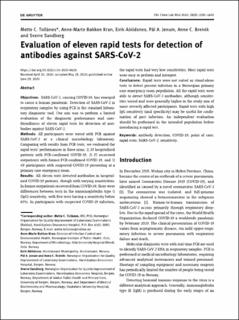Evaluation of eleven rapid tests for detection of antibodies against SARS-CoV-2
Tollånes, Mette Christophersen; Kran, Anne-Marte Bakken; Abildsnes, Eirik; Jenum, Pål; Breivik, Anne Christin; Sandberg, Sverre
Journal article, Peer reviewed
Published version

Åpne
Permanent lenke
https://hdl.handle.net/11250/2763685Utgivelsesdato
2020Metadata
Vis full innførselSamlinger
Originalversjon
Clinical Chemistry and Laboratory Medicine. 2020, 58 (9), 1595-1600. 10.1515/cclm-2020-0628Sammendrag
Objectives: SARS-CoV-2, causing COVID-19, has emerged to cause a human pandemic. Detection of SARS-CoV-2 in respiratory samples by using PCR is the standard laboratory diagnostic tool. Our aim was to perform a limited evaluation of the diagnostic performance and user-friendliness of eleven rapid tests for detection of antibodies against SARS-CoV-2.
Methods: All participants were tested with PCR against SARS-CoV-2 at a clinical microbiology laboratory. Comparing with results from PCR tests, we evaluated the rapid tests’ performances in three arms; 1) 20 hospitalized patients with PCR-confirmed COVID-19, 2) 23 recovered outpatients with former PCR-confirmed COVID-19, and 3) 49 participants with suspected COVID-19 presenting at a primary care emergency room.
Results: All eleven tests detected antibodies in hospitalized COVID-19 patients, though with varying sensitivities. In former outpatients recovered from COVID-19, there were differences between tests in the immunoglobulin type G (IgG) sensitivity, with five tests having a sensitivity below 65%. In participants with suspected COVID-19 infection, the rapid tests had very low sensitivities. Most rapid tests were easy to perform and interpret.
Conclusions: Rapid tests were not suited as stand-alone tests to detect present infection in a Norwegian primary care emergency room population. All the rapid tests were able to detect SARS-CoV-2 antibodies, although sensitivities varied and were generally higher in the study arm of more severely affected participants. Rapid tests with high IgG sensitivity (and specificity) may be useful for confirmation of past infection. An independent evaluation should be performed in the intended population before introducing a rapid test.